This year my dearest and I left for Siem Reap on a small food tour and ended up visiting, among others, the charming HAVEN. TripAdvisor has HAVEN listed as one of the top ten restaurants in Siem Reap, so we decided to reserve a table for the same evening. When we arrived, I met a very pleasant young woman and as is usual in Siem Reap we spoke first in English.
Until Sara – this is her name – said “yes” in German. This being my native language I immediately registered it and responded accordingly. We both laughed out loud and then went on in our conversation, she in typical Swiss German and I in my Rhineland Dialect. We did this in such a heartwarming way that within 10 minutes we knew each other’s life stories – yes, women can do that! :).
We were both completely fascinated with each others projects, our passion for different things and all. So it only felt natural to seal our new friendship with a hug to say goodbye. Also, it made perfect sense to me that I ask Sara for an interview and I’m very happy she agreed as I wanted to know more about HAVEN – a place that is completely unique, magical even. An atmosphere created by people like Sara, who, together with many other good hearts, make a visit to HAVEN a very special experience. Even people who know Sara personally will surely learn something new about her here. Enjoy the read!
When did you first come to Cambodia, and what brought you here?
In 2008, my husband Paul and I arrived here in Cambodia, for the very first time, during our two-year trip around the world and “Boom!” we fell truly, madly and deeply in love with this country, the people and the culture. We then spent a total of 7 months working as volunteers outside Siem Reap. And it was during this time that we realised that we couldn’t turn our backs on Cambodia anymore and wanted to stay here. In early 2011 we moved all here.
Wow, 2 years of world travel – that’s great! How did you get the idea and how did you finance the trip?
[toggler title=”Here you can read the answer or go directly to the next question” ]
We had the idea on Christmas Day 2006, when we were standing at the main station in Zurich waiting for the train to get to Paul’s parents. We had always talked about wanting to move and work abroad (we always dreamt about going somewhere like England, Canada or Sweden). While we were at the train station, it suddenly dawned on me that if we emigrated, we would probably not be able to travel for quite a while, because we would be busy building up a new life at the new place and we would not have time or money to travel. This thought made me sad, because there were still soooo many places that I wanted to see. And so I suggested to Paul to go on a world trip instead. He immediately loved the idea, and by the time we arrived at his parents’ home, we had made the decision and promptly informed the whole family that by 2008 we would go travelling for an indefinite time.
This was the kick-off and so the planning started. Of course we didn’t have enough savings for a trip like this, and we did not win the lottery either. But we were determined and set the priorities accordingly.
The first question was how much money is needed for a world trip? Since we did not want to buy an around-the-world ticket, but wanted to travel freely and without restrictions, all overland with public transport, this question could not be answered at all. That’s why we decided to set the date of departure to April 2008 and simply go with what we could save by then and travel for as long as the money lasts.
From then on, we completely changed our lives in order to earn and save the necessary money: we sold our entire household and gave up our beautiful, but expensive Zurich city apartment. Instead, we became house-sitters and lived as sub-tenants in apartments while the actual tenants were away. We worked extra shifts and took extra jobs. We gave up all our hobbies, we did not go to any concerts anymore, we no longer ate out and we no longer went out. We did not go on holidays or weekend trips anymore. And we did not buy any more stuff (no new clothes, books, whatever), except it was something we really needed then or we needed for the trip and could take with us in our backpacks.
Then on the trip itself we always traveled and lived very low budget. This means that for 2 years we almost always slept in hostels in dorm rooms. We mainly traveled with local buses and trains or on motorcycles and boats. We ate locally and took our time getting around and staying at places.
It was the best time of our lives, and we would not exchange the experiences & adventures for anything in the world.
[/toggler]
What do you love most about Cambodia?
First and foremost, the people. They are warm and generous – in spite of all everything they had to go through in their past and still have to endure in their present. During all our travels we have never encountered a people that radiate such an innocent and honest friendliness like the Cambodians. These people touched our souls and they were also why we did not want to leave anymore.
What do you do when you feel homesick for your home in beautiful Switzerland?
I am always, always, always happy when I see my family or friends from Switzerland. But I have never been prone to homesickness. On the contrary. I have always had a strong sense of wanderlust, which is an integral part of me. But at the moment my heart and my life are set in Cambodia and my commitment to our work here.
You’re not only living in Cambodia but are running the HAVEN restaurant, which has set itself the goal of providing underprivileged Cambodians a sound work education. Tell us a bit about your restaurant.
How did you and your husband get the idea to set up HAVEN, including the training concept?
When we were here the first time in 2008, we noticed all the organisations that take care of children. Eventually we started wondering and asking around, what would happen to the kids when they come of age and have to leave the organisation? This question, however, was answered with a resigned shrug. That is when we came to realise that there were no points of contact for these young adults.
It left us no peace and we knew we couldn’t go back to Switzerland, back to our old lives, and not be concerned about the people here. So, we wracked our brains – what could we do for the kids? We didn’t want to create another institution that relied on donations for survival. No. We wanted to create something that was self-sustaining, and where these young people could learn to care for themselves and could secure a good future. So the idea for a vocational training in catering was born.
The reason why we opted for the restaurant is because we wanted to offer an education in an area where we can find good permanent placements for our newly qualified trainees. With the temples of Angkor, Siem Reap is a booming tourist destination with an endless number of restaurants and hotels that are always looking for professional and well-trained staff.
What is special about your training concept and what distinguishes HAVEN from other methods?
What made us different from the beginning was that we are not a school. While other places (back in 2011, when we first opened in Siem Reap) offered ‘only’ theoretical knowledge, which is then supplemented with an internship placement – our apprentices gain direct entry into the professional world with on the job training.
Our training concept is derived from the Swiss dual vocational training model. This means that our apprentices receive practical training in the restaurant which is combined with theoretical lessons in the classroom. This means that our apprentices undergo systematic training, gain valuable and real life work experience, take personal responsibility, learn to work in a team and strengthen their social skills.
After training is completed, our apprentices are prepared for good permanent positions and are ready to work.
During their training, we take full financial responsibility for our trainees. They live together with our house-mum at the trainee house. Next to the accommodation we also cover all their needs, such as food, medical care, hygiene products, shoes & clothes, bicycles, etc., but also give them emotional support and coach them in their personal development.
After graduation we help everyone to find a job and support them in this transitional period, to make sure they all settle in well.
So far, what are HAVEN’s biggest successes for you personally?
Every trainee that graduates is a success. Until now, we have been able to find good positions for all our trainees, where they can continue to develop and operate at the highest level. But there are also those who were motivated by the teachings with us to continue learning and have subsequently taken a degree, which they can finance with a well-paid part-time job thanks to their training.
They have all become proud and confident young people, who have learned important work and life skills and can therefore take care of themselves and contribute to the world and to others.
What else would you like to achieve with HAVEN? Where do you see the restaurant in 5 years?
We are currently building a bakery at HAVEN. The idea is to extend the doctrine to baked goods.
We can also imagine building more HAVEN restaurants in Cambodia in the future. And we have already received inquiries from abroad, where people want to take the concept and implement it in their countries. These are people we are in touch with and consult.
If you had to describe HAVEN in 3 words, what 3 words would they be?
Compassionate, honest, sustainable – these are the 3 words, that I feel in my heart. Everything we do is always focused on our trainees. Both in the training, as well as in their emotional development.
Without compassion, the idea for HAVEN would never even have arisen and without empathy it would not be what it is today for our trainees and the whole HAVEN family. The family spirit at HAVEN is an honest and caring solidarity that is experienced by each individual. We look after each other, help each other, we say thank you, we apologise and we trust, respect and appreciate each other.
Honesty is an important basis for the fairness and mutual respect that is practiced at HAVEN. This honesty is what our guests feel in the ingredients of their dishes, in the smiles with which they are served and in the knowledge that they are supporting the training program with their visit.
HAVEN’s whole foundation is based on sustainability. That is the reason why we are here in the first place. But our commitment goes even further than the training program for disadvantaged young adults and the creation of safe and well-paid jobs for people from the community. We also set great value on supporting local farmers, social enterprises and nonprofit organisations that are committed to the safe and healthy development of Cambodia.
Where do you see yourself in 5 years?
Still here, with all my heart and soul. But development and change are constant companions in life. That is why we will see where we really are in 5 years. As long as I can bring in my passion and make a difference, I’m happy.
You have written a cookbook, which has just been launched. This is a very exciting project that we would like to learn more about.
How did you come up with the idea for a cookbook?
A French photographer who also lives in Siem Reap, had contacted us in the fall of 2014 and made the suggestion to make a cookbook. He wanted to do food photography and because he was a big fan of our work and our food, he found that we were a super fit. Since we already had some guests who had asked for a cookbook, we were thrilled with this proposal.
How much time did it take for the cookbook to be made?
All in all it took us 1 1/2 years – with interruptions, since HAVEN and the training program always have priority. Furthermore, we were also building the new HAVEN during that time (2015), which was also very time-consuming.
How did you, among the many recipes, figure out which made its way into your cookbook?
That was actually quite simple. We really took the most popular recipes from our menu and supplemented these with our head chef Pardet’s favorite Cambodian recipes.
What distinguishes your cookbook from other cookbooks?
As befits a cookbook, we offer super delicious recipes. But what our cookbook has to offer even more is that HAVEN and our family is placed in the foreground and that by purchasing this book, you are directly supporting our training program. That is why we’ve called the book ‘Cooking for a Cause’. Because both we at HAVEN are cooking for a good cause by training disadvantaged young people, and anyone who buys the book, and prepares our meals at home, is also cooking for a cause and supporting us with this purchase.
What was the most difficult part for you, in the implementation of the cookbook?
Definitely the time because I worked on the cookbook while also running the restaurant, teaching and training, and while building a new restaurant. Another challenge was the ingredients of the Cambodian cuisine. For one thing, until we found all the official English names for each local ingredient and then until we found good substitute ingredients if these typical ingredients were not available outside of Cambodia. We have placed great emphasis on the fact that the book can be used all over the world and the dishes can be cooked everywhere. But for this we really had to get creative and play around with different ingredients until we found good substitutes that worked.
This photo was taken on the day of my departure from Cambodia. More about this will follow soon in another article with insights into the sensational HAVEN cookbook. And I will also report about my beautiful experiences at HAVEN in a separate article, so the plan ;-)
Where can you buy the cookbook?
It can be bought directly at HAVEN in Siem Reap for US$28. Or it can be ordered via our Dragonfly Association in Switzerland for CHF 50.- (plus shipping costs). This price also includes a donation that goes directly to HAVEN.
Maybe it’s a bit early to ask, but would you write another book? If yes, on what topic would the book be?
We are often told that we should share our experiences and adventures in Cambodia by writing a book. Maybe I’ll do that someday. But currently I feel no desire for it, frankly. That may change when I have nothing else to do :)
Now, Cambodia is not exactly a country where everyone is doing well. Although Siem Reap is developing into a lively small town due to tourism, there are still many people and places suffering from poverty. Thus, a rather tricky question at the end, on a sensitive topic, which is of complex importance, namely, how tourists should deal with the existing poverty in Cambodia.
Which 3 tips do you have for tourists to really support local people even during a short stay?
This is an extremely important issue and I am glad you ask. Because many visitors coming to Cambodia are saddened and concerned with what they see here. Hence, they want to help, they want to do something good. That is human and very understandable. Unfortunately though, the obvious actions are ultimately more harmful than beneficial. No matter how well-intentioned they are.
First of all I would like to mention what you really should not do. And that is not to go visit orphanages or institutions with children. One should also not give begging children money and under no circumstances buy Baby Milk Powder for mothers begging with a baby in her arms in the street. A good site to get more detailed information is Think Child Safe. But I also recommend Googling these and general issues before coming to Cambodia.
What you can do however, to help the people here is:
- Get in touch with organisations that really work for the benefit of people and the environment. A good contact point is ConCERT who advise visitors and volunteers and recommend good, support worthy organis
- Visit the “Made in Cambodia Market” or stores with products from local organisations (eg Senteurs d’Angkor, SaoMao etc.) and buy your souvenirs there, rather than the mass produced wares from China and Thailand, which are offered at the usual markets.
- Visit restaurants and cafes that have a good purpose like a training program, such as us, or that cross-finance local organisations.
- And don’t forget to always be nice and friendly to the people here. A smile, a kind word and genuine interest go far. (This is true for us all, always, and worldwide).
Wow, sooo much exciting information! Thank you, dear Sara, for your time. Finally, a few short personal questions for you?
What is your favorite color and why?
I have no favorite color, because I love all the colors and there is none that I would want to emphasize or miss.
Your favorite book and why
Goodness … where do I start?! Since I was little, I read books with passion. There is no other hobby that I like to do as much as that. And hardly a place where I would rather be than in a bookstore or library. Therefore there is not just ONE book that I love, but many, many, many. Among them are The Wind-up Bird Chronicle (Murakami), Midnight’s Children (Rushdie), The Catcher in the Rye (Salinger), The Book Thief (Zusak), Dracula (Stoker), The Lord of the Flies (Golding), and on and on. The list is endless. Really.
[iP] Truly impressive, then I’d say keep it up :-)
Your favorite music and why?
It is similar with music. At an early age, I was always very enthusiastic about music and a very active concertgoer. Since my early teenage days, I am a big fan of Depeche Mode, David Bowie, The Cure and Björk. But I also love artists such as The National, Camera Obscura, Placebo, The XX and Sia.
[iP] Yeah, me too. All of them. That is a sign :-)
Your favorite recipe from your cookbook and why?
From our cookbook? Hmmmm, the dishes are all delicious, otherwise they would not be in the book. But one of my favorites is certainly the Khmer Curry. In my opinion (and I know that many of our guests will agree here) it is the best Khmer Curry far and wide.
[iP] Rightly so! :-)
That’s it
All good things come to an end, and this also applies for this interview. I hope you liked it. Now I have a few key data and information for you, so you can find HAVEN quickly, when you are in Siem Reap. You will surely be just as enthusiastic as I am!
You can find the address here on the map. HAVEN is located in a small side road east of Wat Damnak.
- Website of HAVEN Training Restaurant in Siem Reap
- Facebook-Page of HAVEN Cambodia
- Phone number of HAVEN Restaurant +855 78 342 404

Affiliate*
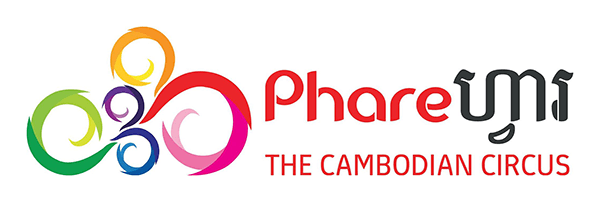
Phare, the Cambodian Circus
A highlight in Siem Reap! Buy tickets online directly on the Circus Phare website*.
Links and references with a * are an affiliate link (advertising link). If you like Visit Angkor and buy, book or subscribe to something via an affiliate link, the provider will make a small commission for Visit Angkor. Of course, there are no additional costs for you.
Join our Facebook group
International travel group with friendly people who love Cambodia. We speak English, German and a little Khmer.
By the way: We write here at Visit Angkor with a lot of passion and love. Nevertheless, it can happen that information is no longer up to date or perhaps even incorrect. We would be happy to hear from you so that we can update the information accordingly. Thank you very much!

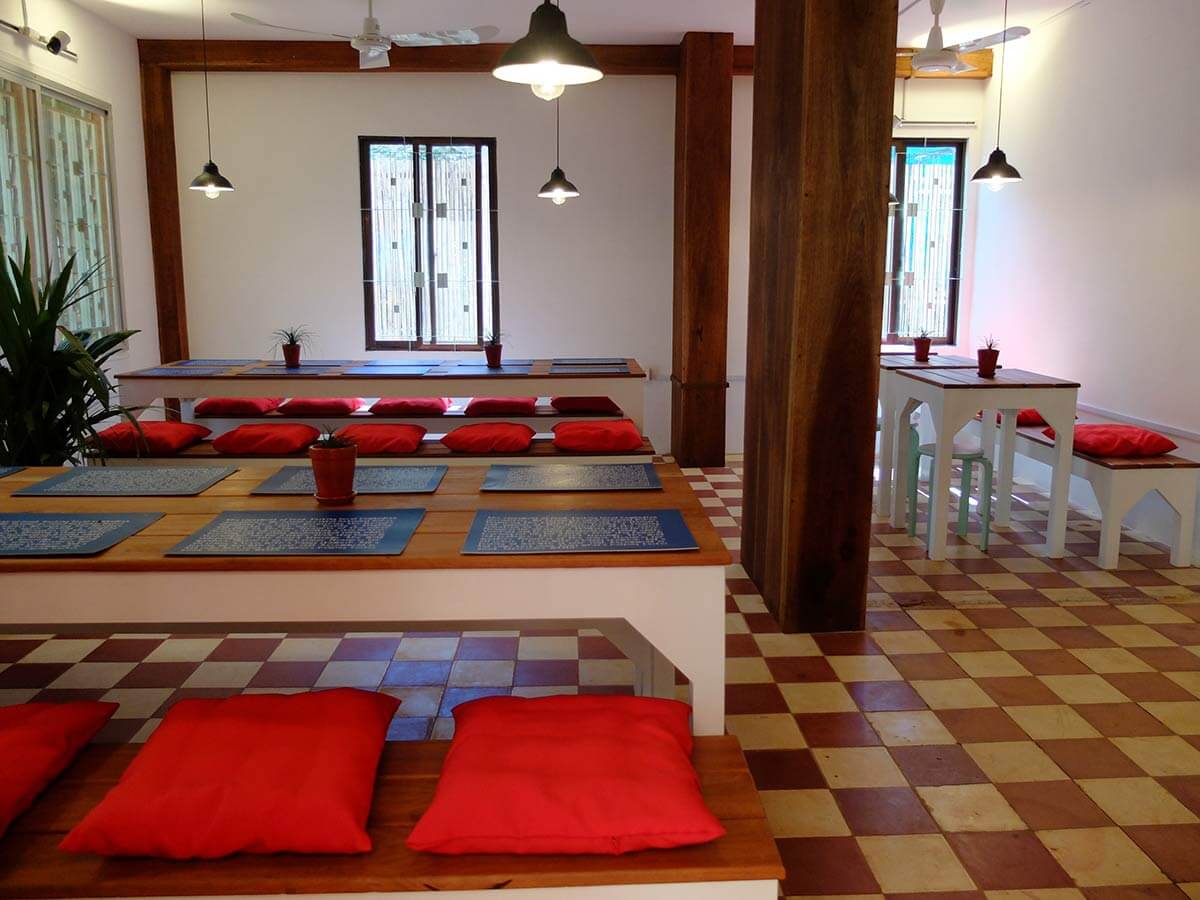
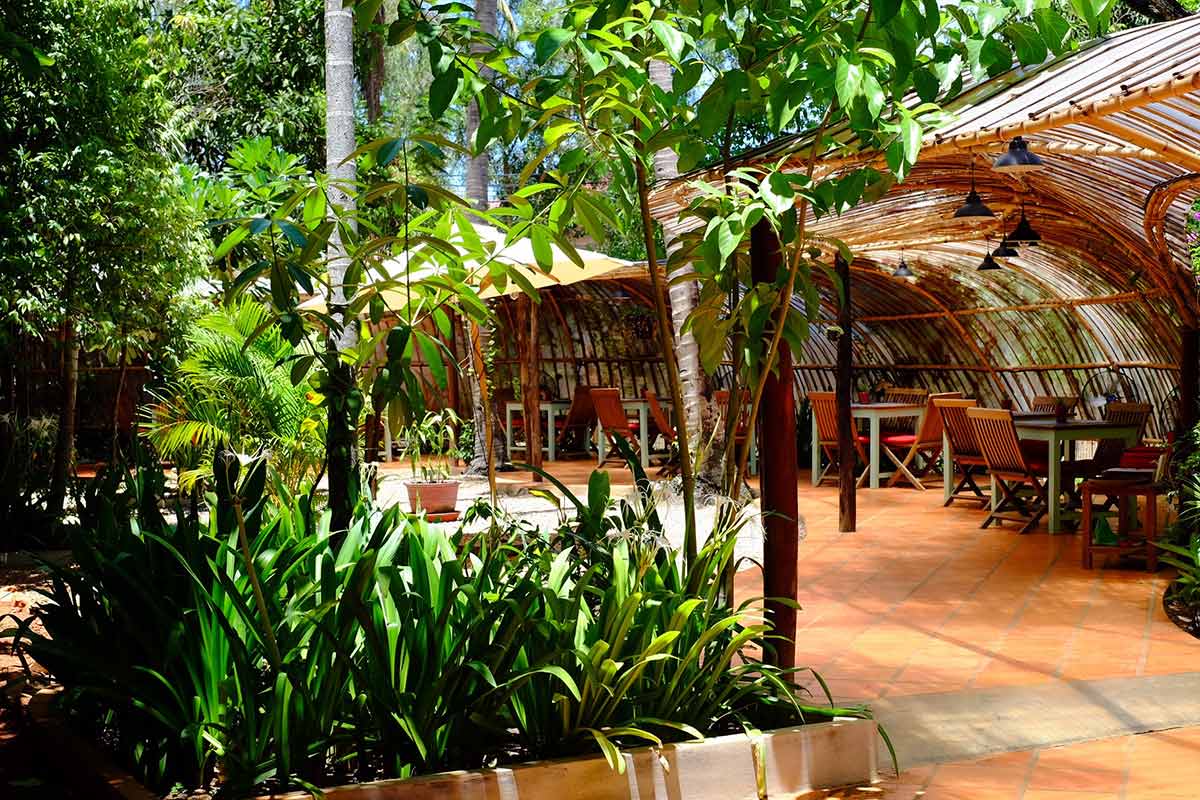
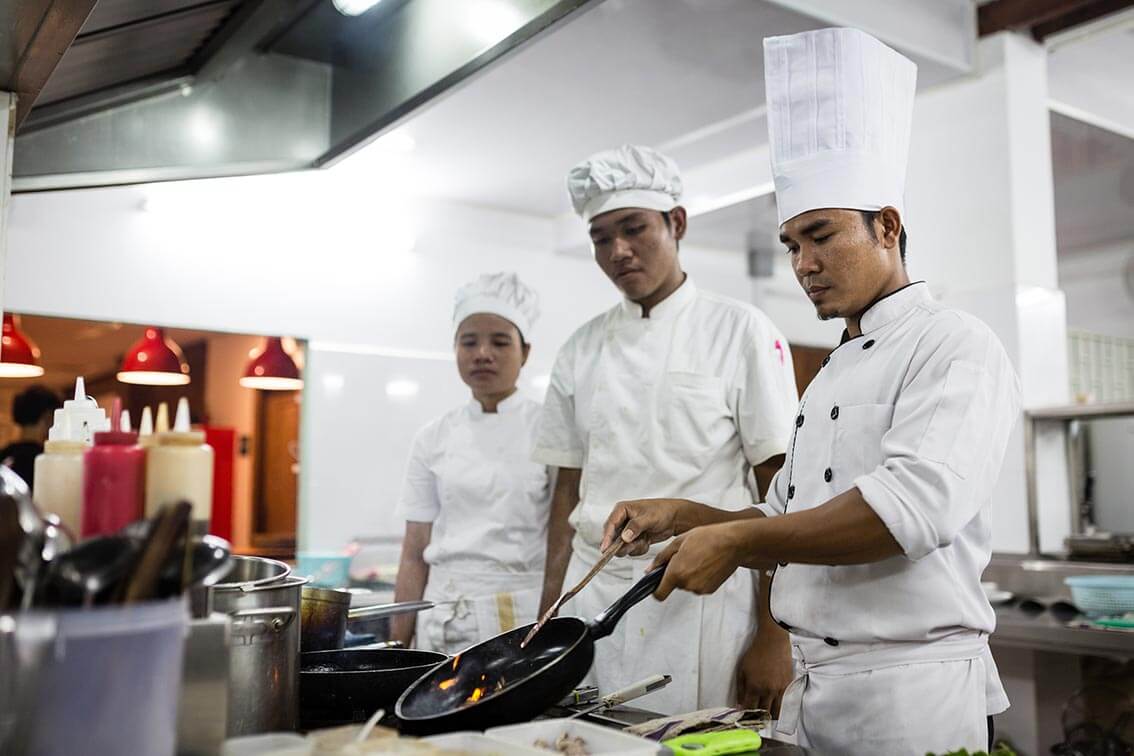
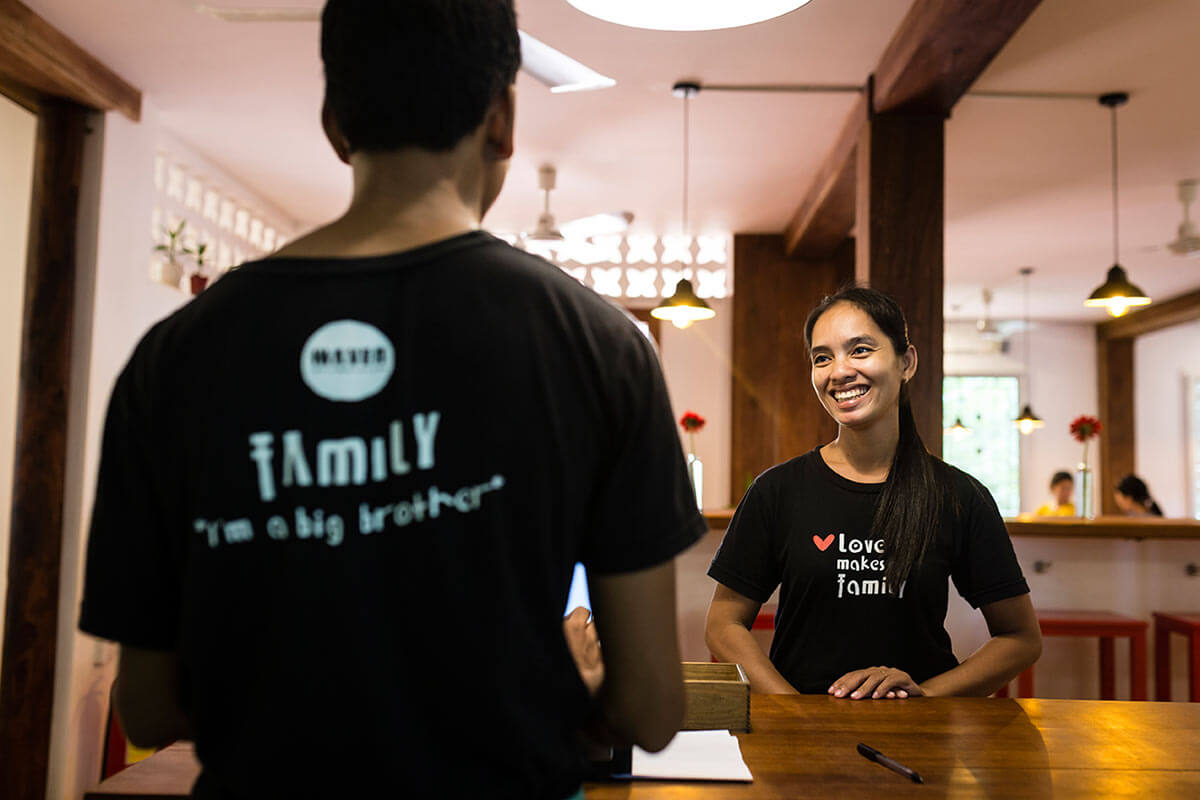
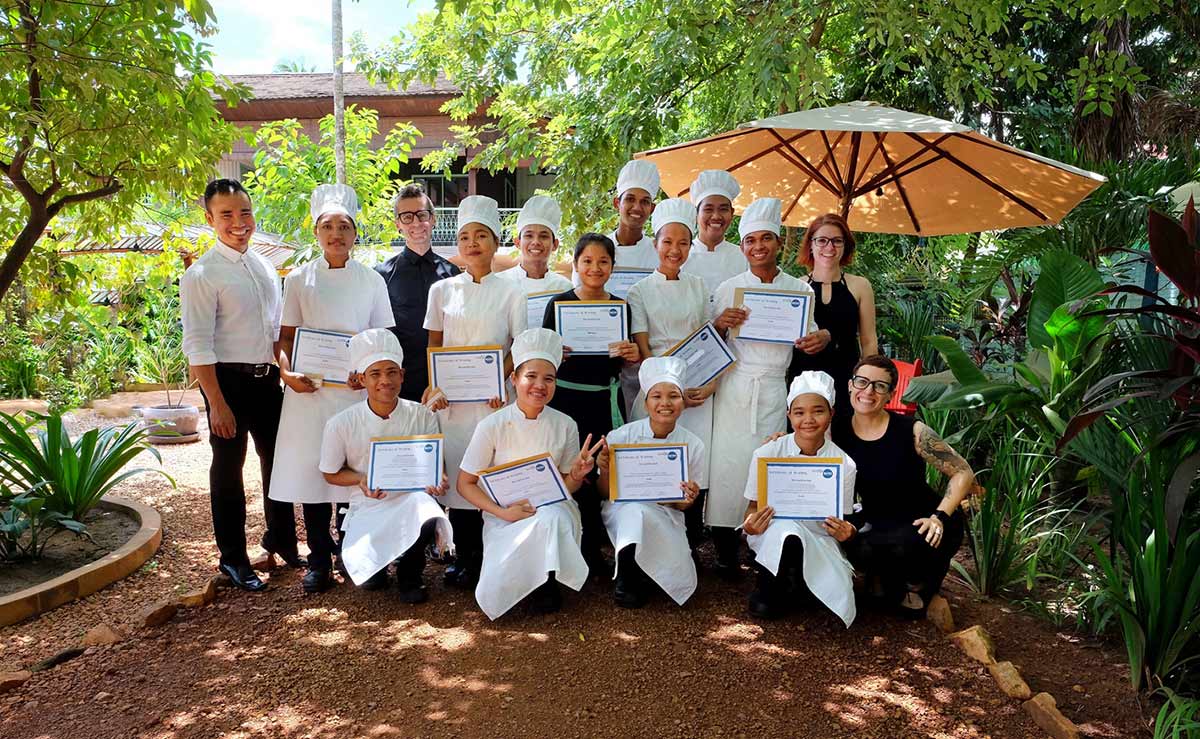
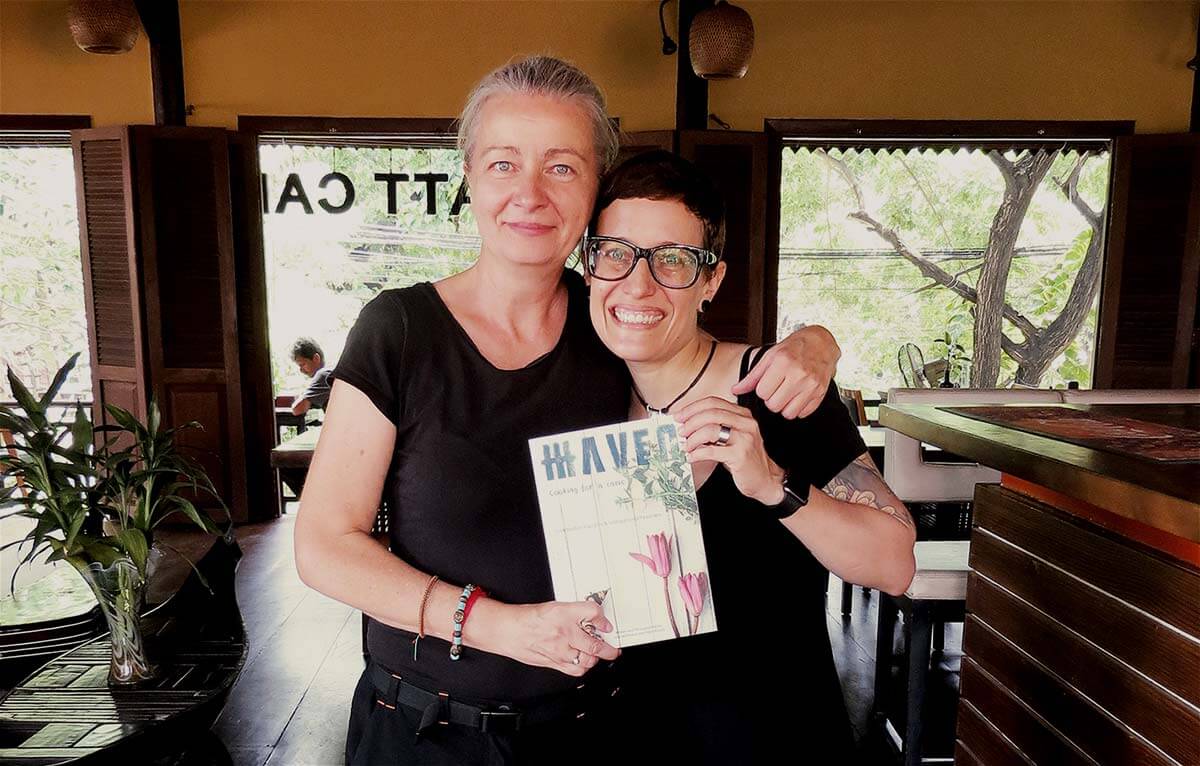

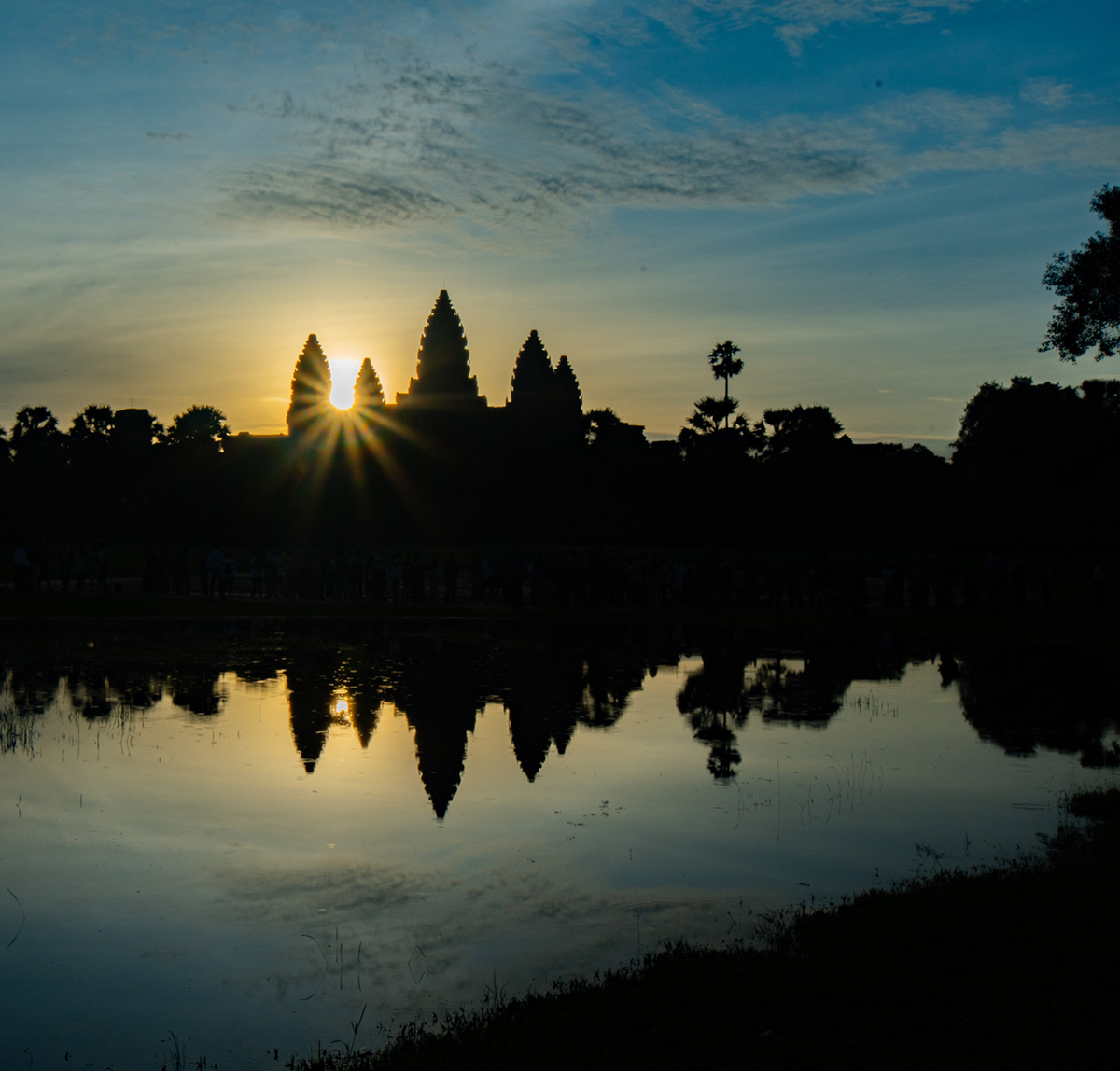

What an interesting article, Inga. Thank you. That is the kind of restaurant I love to support. I enjoyed Friends in Phnom Penh, a restaurant that provides training opportunities to marginalized youth. Such an inspiring article.
Dear Anne – thank you so much for your comment! Yes, HAVEN is a fantastic restaurant – just because of people like Sara. She and her partners live in a positive spirit and really help the Cambodian Youth. Best :) Inga